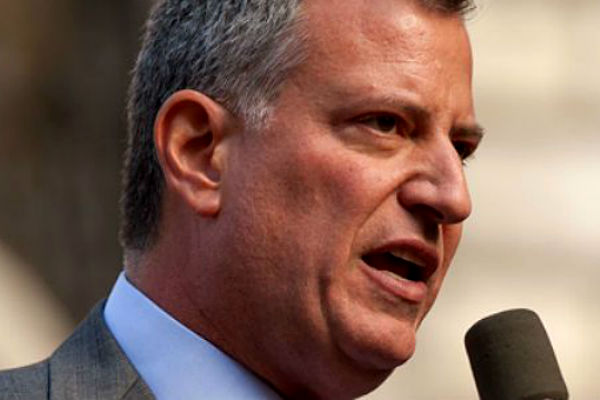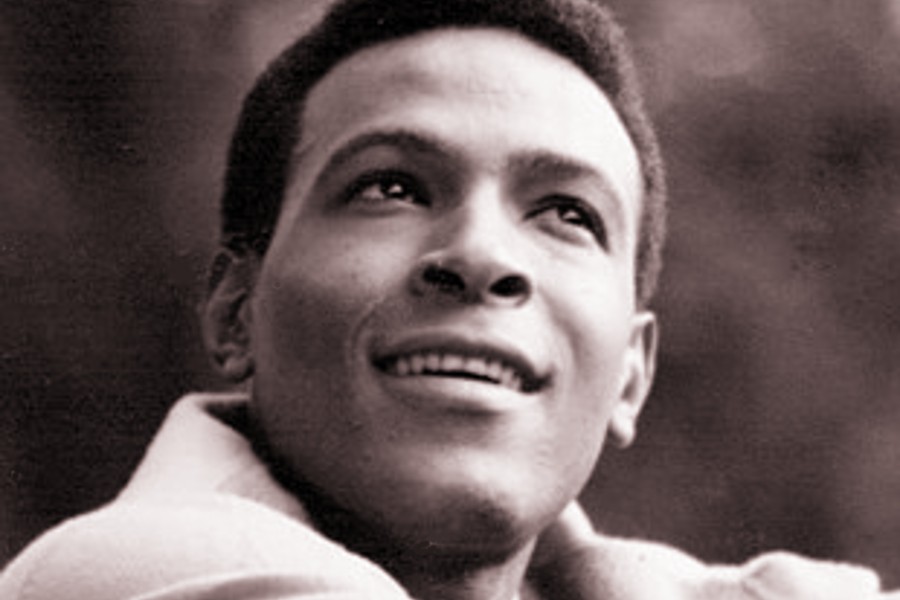 Mayor Bill de Blasio, Emergency Management Commissioner Deanne Criswell and Health Commissioner Dr. Oxiris Barbot today updated New Yorkers on the heat emergency from Harlem to Hollis. Last night, the Mayor signed an Executive Order proclaiming a state of local emergency due to the extreme heat. Temperatures on Friday will be approximately 90 degrees, with temperature forecasts for Saturday and Sunday expected to be 97 degrees. Friday’s heat index is 101 degrees, Saturday’s heat index is expected to be 111 degrees, and Sunday’s heat index is expected to be 110 degrees.
Mayor Bill de Blasio, Emergency Management Commissioner Deanne Criswell and Health Commissioner Dr. Oxiris Barbot today updated New Yorkers on the heat emergency from Harlem to Hollis. Last night, the Mayor signed an Executive Order proclaiming a state of local emergency due to the extreme heat. Temperatures on Friday will be approximately 90 degrees, with temperature forecasts for Saturday and Sunday expected to be 97 degrees. Friday’s heat index is 101 degrees, Saturday’s heat index is expected to be 111 degrees, and Sunday’s heat index is expected to be 110 degrees.
“New York City is dealing with a major heat emergency with temperatures in the high 90s this weekend,” said Mayor de Blasio. “Every single New Yorker must take this seriously. Drink plenty of water, stay cool and seek help if you need it. To limit strain on our energy grid, I have ordered both City government buildings and private office buildings to limit their energy consumption by turning thermostats to 78 degrees. Everyone must do their part to ensure safety until this heat wave passes.”
“Today is the start of a dangerous heat wave. These temperatures are not to be taken lightly,” NYC Emergency Management Commissioner Deanne Criswell said. “If you don’t have to go outdoors, stay inside in an air-conditioned space. If you don’t have AC, visit one of our cooling centers to stay cool.”
“While we are experiencing extreme heat, it is very important to stay cool – especially if you have a chronic health condition,” said Health Commissioner Dr. Oxiris Barbot. “Air conditioning saves lives. They do not need to be on full blast to be effective. Set your air conditioner to 78°F or ‘low cool’ to provide relief from the heat, keep electricity costs down and conserve energy. If you do not have one, call the Human Resources Administration at 1-800-692-0557 or 311 to see if you qualify for a free air conditioner.”
From today at 9:00 AM until Sunday at 11:59 PM, owners of office buildings 100 feet or taller must set building thermostats to 78 degrees to conserve energy from Friday morning to Sunday evening. The Order includes exemptions accommodating for individuals with disabilities or health conditions, to protect sensitive equipment or if required for safety. The Order applies only to office space in applicable buildings, not residential space or ground floor uses, such as theaters, restaurants and retail. City government buildings are already adjusting thermostats to 78 degrees.
The National Weather Service has also issued an Excessive Heat Warning for New York City in effect from 12 p.m. Friday through 8 p.m. Sunday, 7/21. An Excessive Heat Warning is issued when a combination of heat and humidity is expected to make it feel like it is 105 degrees or greater.
To help New Yorkers beat the heat, New York City cooling centers are open throughout the five boroughs through Sunday, July 21. Cooling centers are air-conditioned facilities such as libraries, community centers and senior centers that are open to the public during heat emergencies. To find a cooling center, including accessible facilities, call 311 (212-639-9675 for Video Relay Service, or TTY: 212-504-4115) or visit the NYC Cooling Center Finder at NYC.gov/beattheheat.
The City urges New Yorkers to take steps to protect themselves and help others who may be at increased risk from the heat. People at risk are those who do not have access to air conditioning and:
- Have chronic medical, mental health, cognitive or developmental conditions.
- Take certain medicines that can affect body temperature.
- Have limited mobility or are unable to leave their homes.
- Are obese.
- Misuse alcohol or drugs.
Some New Yorkers are at greater risk when it is hot than others. Older adults are more likely than younger New Yorkers to have some combination of the risk factors described above. In addition, as people get older, their ability to maintain a safe body temperature declines, resulting in an increased risk for heat-related illness.
Check on those particularly Vulnerable to the heat:
• In New York City, most heat-related deaths occur after exposure to heat in homes without air conditioners. Air conditioning is the best way to stay safe and healthy when it is hot outside. Encourage at-risk New Yorkers to use air conditioning. Help them get to an air-conditioned place, even if for a few hours, if they cannot stay cool at home. Make sure they are drinking plenty of water.
• Get to know your neighbors. During extreme heat, call or visit at-risk neighbors, friends and family, such as older adults and anyone with a pre-existing medical condition. This small but crucial gesture can help ensure that we all have a safe and healthy summer.
• During extreme heat, the Department of Social Services (DSS) issues a Code Red Alert, initiating enhanced outreach efforts. During Code Red periods, shelter is available system-wide to accommodate anyone who is reasonably believed to be homeless. Homeless individuals experiencing heat-related discomfort are also able to access the designated cooling area at any shelter; and transportation to cooling centers is available via DSS outreach teams, who are out 24/7/365, checking on and engaging vulnerable clients with greater frequency.
• The Parks Department is extending general swim hours to 8 p.m. at all outdoor Olympic and Intermediate pools Friday, July 19 through Sunday, July 21. City beach hours are also extended until 7 p.m. Friday, July 19 through Sunday, July 21. Parks has more than 600 spray showers, which will remain available until sundown, or later if actively in use by the public. Free SPF 30 sunscreen is available at all City pools and beaches.
Health and Safety Tips for protection Against the Heat:
- Go to an air-conditioned location, even if for a few hours.
- Stay out of the sun and avoid extreme temperature changes.
- Avoid strenuous activity, especially during the sun’s peak hours: 11 a.m. to 4 p.m. If you must do strenuous activity, do it during the coolest part of the day, which is usually in the morning between 4 a.m. and 7 a.m.
- Remember: drink water, rest, and locate shade if you are working outdoors or if your work is strenuous. Drink water every 15 minutes even if you are not thirsty, rest in the shade, and watch out for others on your team. Your employer is required to provide water, rest, and shade when work is being done during extreme heat.
- Wear lightweight, light-colored clothing when inside without air conditioning or outside.
- Drink fluids, particularly water, even if you do not feel thirsty. Your body needs water to keep cool. Those on fluid-restricted diets or taking diuretics should first speak with their doctor, pharmacist, or other health care provider. Avoid beverages containing alcohol or caffeine.
- Eat small, frequent meals.
- Cool down with a cool bath or shower.
- Protect your pets and service animals when extreme heat strikes:
- Never leave pets in the car. Temperatures rise quickly even with the windows down and can be deadly for your pet. Call 911 if you see a pet or child in a hot car.
- Be sure your pets have access to plenty of water, especially when it is hot.
- Make sure your pet has plenty of shady places to go when outdoors.
- Avoid exercising with your pet outside on extremely hot days.
- Be sure your pet or service animal has plenty of food and water.
- • Participate in activities that will keep you cool, such as going to the movies, shopping at a mall, or swimming at a pool or beach. The best thing anyone can do to stay safe in and around the water is to learn to swim. The NYC Parks Department has free swimming lessons for kids and adults. Visit here for more information on pool and water safety.
- • Make sure doors and windows have tight-fitting screens and, in apartments where children live, window guards. Window guards can prevent children from falling out of a window and suffering serious injuries or even death. Screens keep mosquitoes that can spread West Nile Virus out of your home and keep cats from falling out of windows.
- • Never leave your children or pets in the vehicle, even for a few minutes.
- • Check on your neighbors during a heatwave, especially if they are seniors, young children, and people with disabilities and access and functional needs.
Know the warning signs of the illness:
Call 911 immediately if you or someone you know has:
- •Hot dry skin.
- •Trouble breathing.
- •Rapid heartbeat.
- •Confusion, disorientation, or dizziness.
- •Nausea and vomiting.
If you or someone you know feels weak or faint, go to a cool place and drink water. If there is no improvement, call a doctor or 911.
Improper Fire Hydrant Use:
The improper opening of fire hydrants wastes 1,000 gallons of water per minute, causes flooding on city streets, and lowers water pressure to dangerous levels, which hamper the ability of the Fire Department to fight fire safely and quickly.
Properly used “spray caps” reduce hydrant output to a safe 25 gallons per minute while still providing relief from the heat. To obtain a spray cap, an adult 18 years or older with proper identification can go to his or her local firehouse and request one.
Energy-Saving Tips:
During periods of intense electrical usage, such as on hot, humid days, it is important to conserve energy as much as possible to avoid brownouts and other electrical disruptions. While diminishing your power usage may seem inconvenient, your cooperation will help to ensure that utilities are able to provide uninterrupted electrical service to you and your neighbors, particularly those who use electric powered medical equipment or are at risk of heat-related illness and death:
- Set your air conditioner to 78°F or “low.”
- Run appliances such as ovens, washing machines, dryers and dishwashers in the early morning or late at night when it is cooler outside to reduce heat and moisture in your home.
- Close doors to keep cool air in and hot air out when the air conditioner is running.
- Keep shades, blinds, and curtains closed. About 40 percent of unwanted heat comes through windows.
- Turn off air conditioners, lights, and other appliances when not at home, and use a timer or smart technology to turn on your air conditioner about a half-hour before arriving home. Keep air conditioner filters clean.
- If you run a business, keep your door closed while the air conditioner is running.
- Tell your utility provider if you or someone you know depend on medical equipment that requires electricity.
“Heat-related illness can be life-threatening to older New Yorkers. Keep yourself and older neighbors, friends, and loved ones safe and cool during extreme heat. New Yorkers always step up, so please remember to check in on older adults during this heat emergency. Stay inside with an air conditioner, visit a public pool, or go to a cooling center — many of which are senior centers,” said Department for the Aging Commissioner Lorraine Cortés-Vázquez.
“We urge New Yorkers to exercise extreme caution in the coming days,” said NYC Parks Commissioner Mitchell J. Silver, FAICP. “We encourage all to take advantage of our city resources including cooling centers, spray showers and extended beach and pool hours to beat the heat.”
Become a Harlem Insider!
By submitting this form, you are consenting to receive marketing emails from: Harlem World Magazine, 2521 1/2 west 42nd street, Los Angeles, CA, 90008, https://www.harlemworldmagazine.com. You can revoke your consent to receive emails at any time by using the SafeUnsubscribe® link, found at the bottom of every email. Emails are serviced by Constant Contact








